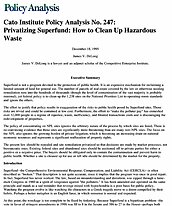Superfund is not a program devoted to the protection of public health. It is an expensive mechanism for reclaiming a limited amount of land for general use. The number of parcels of real estate covered by the law or otherwise needing remediation runs into the hundreds of thousands (though the level of contamination of the vast majority is probably minimal), yet federal policy is to clean up the 1,238 sites on the National Priorities List to operating-room standards and ignore the others.
The effort to justify that policy results in exaggeration of the risks to public health posed by Superfund sites. Those risks are trivial and could be contained at low cost. Furthermore, the effort to “make the polluter pay” has enmeshed over 32,000 people in a regime of injustice, waste, inefficiency, and bloated transactions costs and is discouraging the redevelopment of properties.
The policy of concentrating on NPL sites ignores the arbitrary nature of the process by which sites are listed. There is no convincing evidence that those sites are significantly more threatening than are many non-NPL sites. The focus on the NPL also ignores the growing burden of private litigation, which is becoming an increasing drain on national economic resources and represents a significant reallocation of property rights.
The present law should be repealed and site remediation privatized so that decisions are made by market processes, not bureaucratic ones. Existing federal sites and abandoned sites should be auctioned off to private parties for either a positive or a negative price. The buyers should be obligated only to contain the contamination and prevent harm to public health. Whether a site is cleaned up for use or left idle should be determined by the market for the property.
About the Author

This work is licensed under a Creative Commons Attribution-NonCommercial-ShareAlike 4.0 International License.
